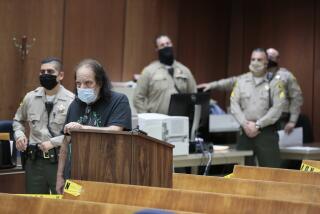Condemned Inmate’s Counsel Called Deficient
- Share via
A Sacramento man who has been on death row for 20 years for murder and rape is entitled to a new sentencing hearing because he received constitutionally deficient legal representation, a federal appeals court in San Francisco ruled Monday.
The decision was the fifth this year in which the U.S. 9th Circuit Court of Appeals, which covers nine western states, has ordered a new sentencing hearing for a death row inmate in California.
The court ruled 2 to 1 that trial attorneys for James L. Karis, 50, had failed to adequately investigate his childhood, including beatings and molestations.
If the attorneys had thoroughly investigated Karis’ background and presented adequate evidence, a jury might have given Karis a life sentence rather than the death penalty, the panel ruled.
In 1981, Karis kidnapped two El Dorado County welfare department employees at gunpoint on a Placerville Street while they were on their lunch break.
He drove them to a remote area, ordered the women to disrobe, bound one of them and raped the other.
Karis ordered the women into a hole and after one of them pleaded for their lives, he shot them with a handgun and covered them with stones, according to trial testimony.
One of the women feigned death and after Karis left she crawled out of the hole, made her way to a nearby road and was rescued. Karis was arrested a week later in Sonoma County.
The case was transferred to Sacramento from El Dorado County because of extensive publicity about the gruesome crime. The surviving victim testified against Karis at the 1982 trial.
The conviction and death sentence had previously been upheld by the California Supreme Court. The U.S. Supreme Court had declined review.
After those actions, the defense filed claims in federal district court in Sacramento. Monday’s decision comes more than three years after a federal judge in Sacramento first vacated Karis’ death sentence on the recommendation of a magistrate.
The ruling, written by Judge Procter Hug Jr., said that the magistrate was correct in determining that a defense lawyer who had “performed a proper investigation could have offered substantial and wrenching evidence of [Karis’] violent and abusive childhood.”
The defense lawyers could have obtained information that Karis saw his father and stepfather “viciously beat his mother; that both men also beat and abused him; and that [his father] molested him,” the federal magistrate judge, John F. Moulds, wrote.
Hug, joined by Judge James R. Browning, also agreed with Moulds’ reference to a 1990 U.S. Supreme Court decision on the potential impact of such mitigating evidence:
“Evidence about the defendant’s background and character is relevant because of the belief, long held by this society, that defendants who commit criminal acts that are attributable to a disadvantaged background, or to emotional and mental problems, may be less culpable than defendants who have no such excuse.”
The panel concluded that Karis’ trial attorney had performed deficiently and that the failures had prejudiced Karis’ case, under standards delineated by the U.S. Supreme Court.
Karis’ appellate lawyer Norman J. Hile utilized testimony from a psychiatrist, a medical doctor and a criminal defense lawyer in the hearing before the magistrate.
The 9th Circuit also sustained the ruling of the federal district judge in Sacramento upholding the guilty verdict against Karis.
Karis has spent much of his adult life in prison. At the time of his arrest, Karis had been free on parole six months from the 1976 rape of a 17-year-old high school student in Santa Clara County.
Earlier, he had been imprisoned from 1971 to 1975 for a rape in Orange County.
In a dissent, 9th Circuit Judge Andrew J. Kleinfeld referred to Karis’ lengthy record and linked it to his conclusion that the majority had improperly applied Supreme Court precedents on ineffective counsel.
“Counsel thoroughly investigated and prepared,” Kleinfeld wrote, referring to Karis’ trial lawyers. “The problem was that the investigation turned up little evidence. The shortage of evidence was because Karis was a very bad man.”
He said Karis’ attorney had not shown that there was a “reasonable probability” that the outcome of the sentencing would have been different but for the trial lawyer’s errors.
“Though a jury in this case, as in any case, could have gone the other way, it was not counsel’s fault that it did not,” he said.
Nathan Barankin, a spokesman for California Atty. Gen. Bill Lockyer, said the office was reviewing the ruling and had made no immediate decision on whether to seek a rehearing before a larger panel of 9th Circuit judges.
More to Read
Sign up for Essential California
The most important California stories and recommendations in your inbox every morning.
You may occasionally receive promotional content from the Los Angeles Times.










